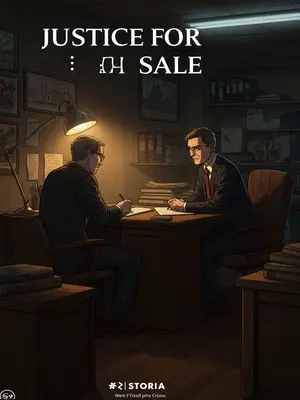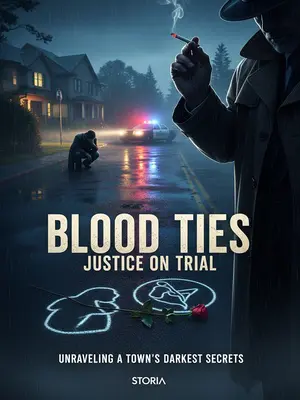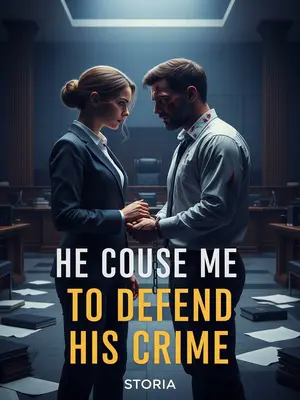Chapter 2: The Weight of Suspicion
The girl's name was Emily Carter. Both of her parents had passed away, so she had always lived with her grandfather, Joe Carter, a farmer in the area.
Emily Carter—a name so ordinary it almost blended into the county records. She’d been a familiar face at Sunday service, quiet, polite, always tagging along behind Joe in her too-big hand-me-downs. Folks remembered her best for her shy smile and the way she always hugged her backpack close in the school hallway.
After the incident, we found the grief-stricken Joe Carter to question him, and only then did we learn the details.
He greeted us on his front porch with a kind of exhaustion that ran deeper than bone. The screen door banged softly behind him. You could tell he hadn’t slept in days—his eyes were red, hands shaking as he clutched a faded baseball cap. He tried to offer us coffee out of habit, but his mind was miles away from hospitality.
As Emily's sole guardian, he actually had no idea that the child was pregnant.
You could see it pained him to admit it. He spoke with the hesitant guilt of a man who’d spent too many years believing he could protect his family if he just worked hard enough.
During those eight or nine months of pregnancy, Emily’s belly did bulge a bit, but Joe simply thought she was growing and putting on weight.
He shrugged, almost defensively. “Kids fill out at that age. I figured she was just growing. She never said a word.” The implication lingered between us: in this town, where folks didn’t pry, a little extra weight on a kid was hardly unusual, especially when mealtimes depended on what you could scrape together that week.
So, when Emily complained of stomach pain that day, he just assumed she had a stomachache.
He’d seen his share of childhood ailments—too much soda from the gas station, or maybe some bad lunch meat. He told her to rest at home and drink more water, not paying any special attention.
He never imagined Emily was actually about to give birth.
It’s the sort of thing that would haunt any caretaker—one of those quiet, everyday moments that suddenly becomes a hinge for tragedy.
So, as usual, he worked until sunset before returning home.
He told us about trudging back up the dusty driveway, boots caked with mud and sweat sticking his shirt to his back. The sun had dropped below the trees, leaving the farmhouse in shadow. He remembered thinking the porch light seemed too dim, as if warning him something was off.
When he arrived, he immediately sensed something was wrong.
The house was too quiet. Even the old hound that usually barked at him was silent. As he stepped through the doorway, he felt that instinctive chill—like the world was holding its breath.
Emily was lying motionless on the bed. Her lower body, as well as the sheets and comforter, were soaked in blood.
He described it in broken sentences—her hair fanned out on the pillow, skin pale as the sheet, the bedding a red so bright it barely seemed real. He stood there frozen, his mind refusing to piece together what his eyes saw. The only sound was the cicadas outside, droning on like nothing had changed. Only when he tried to shake her awake did the reality hit him.
She must have been in excruciating pain, suffering for a long time.
He kept repeating, “She didn’t call for help. She didn’t make a sound.” The guilt in his voice was heavy—like he’d failed her not just as a guardian, but as family.
This tragic death, though ultimately ruled an accident, had an extremely negative impact on the community. Our criminal investigation team was immediately assigned, with me and my colleague Jason Miller taking the lead.
Word spread like wildfire, as it always does in a town where everyone knows everyone’s business. The coffee shop regulars fell silent, the waitress topping off burnt coffee under the hum of the old jukebox. Even the local Facebook group was uncharacteristically grim. My partner Jason and I were assigned as lead investigators—a job that felt less like police work and more like picking through the aftermath of a tornado.
Because she was only 12, according to state law, regardless of whether she consented, anyone who had sexual relations with her was suspected of statutory rape.
The law’s clear: at twelve, there’s no such thing as consent. Every parent in town knew it, and every glance from the neighbors carried the silent question—how could this have happened here?
We asked Joe Carter if he knew whether Emily had been especially close with any man, but he knew nothing.
Joe shook his head, bewildered. He mumbled about how Emily mostly kept to herself, spent time with her friends, and came straight home after school. He looked lost, as if each question chipped away at what little certainty he had left.
Even though we didn’t question him directly, we couldn’t help but harbor suspicions in this direction.
It’s a sad truth, but when a case starts like this, suspicion falls hardest on the ones closest to the victim. Even if we didn’t ask outright, the question hung in the air. Joe must have felt it, because he started rambling about alibis and his daily routines before we even brought it up.
After all, Joe Carter was only 52 at the time. In rural areas, it’s not uncommon for people to become grandparents in their early forties, as late marriage and childbirth aren’t the norm.
He’d had his kids young, like a lot of folks out here. The family tree branched early, with generations living side by side under weathered roofs. Still, there was nothing to suggest Joe was anything but a tired, grieving grandfather.
If it really was him, it would be truly inhuman.
Even Jason, who’d seen his share of ugliness, looked shaken at the idea. “If this comes back on Joe…” he whispered one evening, trailing off without finishing the thought. Some betrayals are too terrible to name.
With no evidence of multiple assailants, our only option was a DNA comparison. Whoever fathered the child was the perpetrator.
We followed procedure—sealed evidence bags, careful paperwork, and the solemn silence that comes with waiting for science to do what human intuition can’t. No matter how much the community speculated, we needed hard proof.
Fortunately, the test results showed that Joe Carter was not the father of Emily’s baby.
Jason let out a breath I didn’t realize he’d been holding. Joe’s relief was mixed with fresh confusion and grief; the monster was still out there, and now suspicion would shift elsewhere.
So, who was the father?
The question loomed over us all. If not Joe, then who in this tight-knit community could have done something so horrific? The answer would shake the town to its core.













